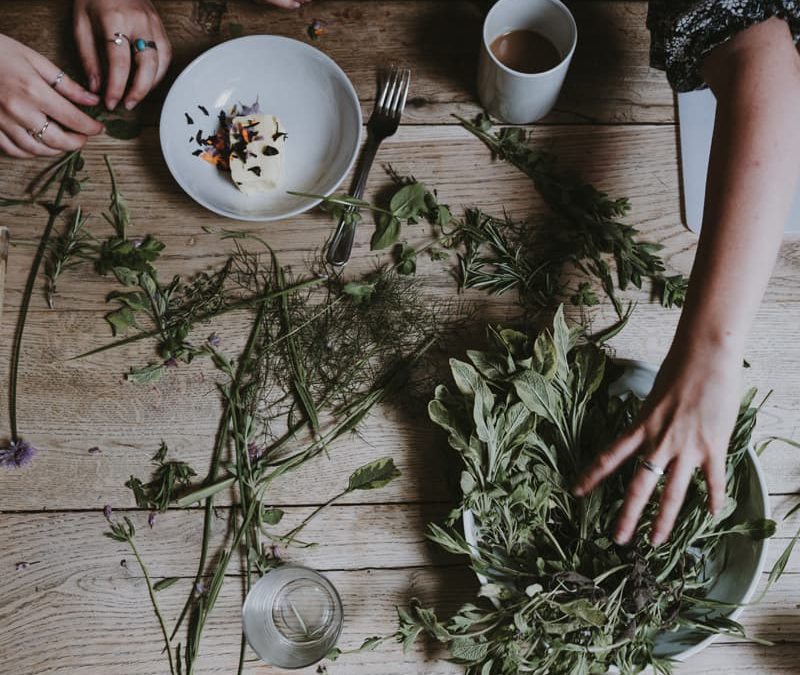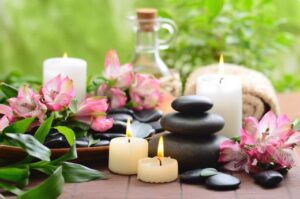The most common herbs used for natural healing for new mums are those that combat and relieve the after-effects of the powerful and transformational experience of birth.
There is a long history of the use of herbs during early motherhood, speeding up wound healing, enhancing nutrition, calming the nervous system and boosting energy.
Indeed in some cultures post partum herbs are an absolute necessity. For example, almost all new mothers (and many new fathers) that I meet would do anything to achieve more sleep. It is so vital to our general well being to get adequate good quality rest. There are plenty of natural ways to achieve this and much more. We will take a look at some common herbs and homeopathic medicines used to boost energy, relieve stress, combat pain and lift mood.
One word of advice is when planning to use herbs during gestation and birth, to consult the advice of a qualified herbalist is the wise path, not self-prescribing. This article does not replace the good guidance received by a qualified herbalist but will enlighten you, the read as to how herbs can support you through the experience.
Herbs for Energy
The herb oats (Avena sativa), is better known as a breakfast meal these days, however its value as a nervous system tonic is unquestionable! In the United States oats ranks as one of the top seven herbal remedies sought by consumers as alternative medicine either eaten as a food, or taken as a tea or better still in tincture form.
It is renown for boosting energy levels and fighting fatigue at the same time as calming the nerves. This is possibly due to the avenacosides it contains such as avenin which stimulates neuromuscular activity. British herbalist Douglas Schar [1999:98] recommends oats for also boosting sex drive by increasing sexual desire and improving sexual satisfaction, and speeding up recovery after surgery.
Eating a bowl of oats a day can help, Schar says, to improve focus and mental acuity later in the day especially for busy people who are short on time. If indeed you are pressed for time, get yourself some oats tincture in drops form and take it throughout the day, whenever you feel you need a boost.
This provides a more potent dose of the herb and is an easy enough practice for most of us to maintain. Oats are suitable in drop dose for long term use as well.
Herbs for Stress
Stress is a major issue for new parents when they find that the rhythms and routines of their daily life has been irrevocably changed by the arrival of a delightful new soul.
But the key to stress is not always about avoiding or reducing the level of stress, it’s about how you handle stress. Improving the health of your nervous system improves your coping ability and lessens the perception of stress. Oats again is the herb of choice, because it such a great source of nutrition for the nerves.
Take it daily in tincture form. Also, surrounding yourself with the aroma of lavender, chamomile and wild rose will also help as these exert calming effects on the body. Lavender and chamomile have been used historically to calm the emotions and create more inner peace.
They are very different plants, one incredibly touch and resilient, the other extremely delicate. Yet they both contain substances that do very similar things like reduce inflammation, prevent infections and improve sleep! Wild rose is an emotions harmoniser and often used in beauty and skincare products as it suits many skin types and is deeply nourishing.
Gentle flowing massage with products containing these plant oils and extracts is another way to introduce their therapeutic abilities into the body, and good medicine for the nervous system.
Herbs for Pain
Pain and bruising from birth are best healed with the homeopathic Arnica. It contains chemicals called sesquiterpene lactones that quickly permeate the skin to reduce inflammation and post-surgical bruising. The results of modern clinical trails suggest that the effectiveness of any Arnica product depends entirely upon using a strong and potent plant as the raw material, supporting the use of organic and biodynamic Arnica products.
For best results use homeopathic Arnica immediately from birth and throughout the post partum period to speed up healing and reduce discomfort. The best homeopathic potency is 30C for healing after birth. Along with Arnica, another plant that is very useful for pain relief is St Johns Wort (Hypericum), a herb known well for alleviating mild depression.
The black spots on the leaves reflect its usefulness is healing puncture wounds and stabbing pains. The homeopathic preparation of this herb harnesses the powerful anti-inflammatory actions of the plant and works to relieve pain that is sharp and shooting in nature. Dugoua et al [2006:e272]
It’s important not to ignore pain as there is a recognized link between pain and depression, with almost 30% of people who complain of chronic pain also experiencing depression. Furthermore, there is evidence that women may actually have a lower tolerance for pain than men due to reduced activity of pain-suppressing chemicals called opioids in a womans brain compared to a mans.
As one would expect, Opioid activity really jumps up before and during childbirth! [Smith 2004:20] However after birth, women are prone to experiencing depression as sensitivity to this chemical gradually falls back to normal levels. Sustaining the process of pain relief after birth can be aided with both Arnica and Hypericum as homeopathic remedies and also by self-loving practices such as massage therapy, time with friends, time spent doing things you love, and of course, the companionship of a partner.
Herbs for the Baby Blues
It is not surprising that along with lack of sleep, exhaustion and stress one may start to feel more than a little blue. Symptoms of the Baby Blues include irritability, self-blame, feelings of panic and overwhelm, feeling gloomy, insomnia and weepiness.
To calm your nerves and help you to cope with the challenges of this time use St Johns Wort. This herb has been shown to be more effective than some pharmaceutical medications in the treatment of mild to moderate depression.
The therapeutic ingredients found in this bright yellow flowering plant include hypericin which is a serotonin reuptake inhibitor (meaning it keeps levels of serotonin high preventing a dip in mood). St Johns Wort is generally considered to be safe to use during lactation with only a very low risk of lethargy and colic.
It can be found in many forms including teas, tincture preparations, homeopathics and infused oil all with their distinct therapeutic uses. Also look to aroma as a powerful mood lifter. The scent of wild roses has a particularly good harmonizing effect on the emotions, and both chamomile and lavender are soothing and relaxing to the nerves.
Article written by Su-lin Sze August 2008, an independent herbalist, writer and consultant to Weleda Australia. www.weleda.com.au
References
Jean-Jacques Dugoua, Edward Mills, Daniel Perri, Gideon Koren (2006) “Safety and Efficacy of St. John’s Wort during Pregnancy and Lactation” Canadian Journal of Clinical Pharmacology, v.13, pp.e268-e276
Douglas Schar (1999) “7 Super Herbal Tonics”, Prevention v.51, iss.1 p.98
Gerard DiFiore (2004) “Arnica’s mechanism explained”, Original Internist, v.11, iss.3, p.4
Smith, Susan A. (2008) “Double trouble: the axis of pain and depression.” Psychology Today v.37, iss.4, p.20
Arnica – the miracle worker
Arnica is an ideal medicine for birth and beyond, and is an essential addition to any first aid kit both in homeopathic form (ingested) and oil or cream form (topically applied). It’s an incredibly versatile healer that is best known for the treatment of bruising. Actually, the main therapeutic use of arnica is for inflammation, and this means that it’s useful for a whole range of conditions including, but not limited to, bruising. Arnica can help relieve long labour, afterpains, arthritis, back pain, sprains, muscular aches, skin irritation, recovery from surgery, rheumatic pains and bleeding gums.
Arnica contains potent chemical compounds called sesquiterpene lactones, and it is these active ingredients that help your body fight bacterial and fungal infections, reduce the sensation of pain, reduce swelling and also stop capillary bleeding. In clinical trials, arnica has been proven to be as powerful as pharmaceutical anti-inflammatories like ibuprofen. This is great news because now you can get strong anti-inflammatory action without the side effects of a non-steroidal anti-inflammatory drug.
You can purchase arnica in an oil or cream base, and it’s best to use a topical preparation that also contains other inflammation-fighting herbs such as Betula alba, Calendula and Oleo Europaea. Arnica also comes in homeopathic form as pilules or liquids, in various potencies, which are taken internally. Homeopathic preparations do not contain measurable amounts of the plant substance. Arnica 30C is the standard potency for physical ailments.
If you are using arnica oil or cream topically to treat inflammation or bruising, follow these steps to optimise the effects:
• apply quickly to the wound site, before any discolouration of the skin and underlying tissues occurs. This will help prevent bruising.
• take homeopathic arnica internally as well as applying a topical arnica cream to enhance your healing
• use an organic and biodynamic arnica extract in an oil or cream base, applying to the wound site with gentle massage. Research shows better results are obtained from arnica grown organically.
Never use arnica on broken skin. It is also not advisable to ingest the arnica plant, unless under the guidance of an herbalist, as ingestion has been known to cause cardiotoxic symptoms.
If you have a tendency to bruise easily arnica will certainly be helpful in acute situations. At other times, look at your diet and ensure you are eating a high proportion of raw foods, which contain plenty of anti-oxidants and bioflavonoids to fight inflammation. Easy bruising can be a sign of vitamin C deficiency which means you should eat more strawberries, kiwi fruit, oranges and fresh foods. Dark leafy greens include antioxidants to prevent cellular damage, and also vitamin K, an important facilitator of the blood clotting and healing process. Buckwheat, often found in healthy breads, contains rutin, a capillary strengthener. If you are breastfeeding, you can drink a nursing tea containing the herbs aniseed, fennel, caraway and fenugreek, which are also strong anti-inflammatories.
Like many natural medicines, arnica offers you an opportunity to strengthen your innate healing abilities without having to contend with uncomfortable side effects. It’s inexpensive, natural and suitable for all ages. Always follow instructions and if unsure about your usage of arnica, consult your naturopath or homeopath.
This article was written by Su-lin Sze. She is a practising naturopathic a consultant to Weleda Australia, producers of natural and biodynamic products for mother and baby. For more information about Weleda see: http://www.weleda.com.au
References
1. Kouzi. S, Nuzum. D, (2007) “Arnica for bruising and swelling.” American Journal of Health-System Pharmacy vol.64, iss.23, pp.2434-2439
2. DiFiore, Gerard (2004) “Arnica’s mechanism explained.” Original Internist vol.11, iss.3, p.41
3. Bone K (2008) “Arnica gel as good as topical ibuprofen.”, Townsend Letter iss.294, p.59
4. FerrariniI. S, GraebinI. C, LimbergerII. J, CantoI. R, DiasI. D, da RosaII. R, Fátima MadeiraIII. M, Eifler-LimaI. V, (2008) “Synthesis of limonene β-amino alcohol derivatives in support of new antileishmanial therapies”, Memórias do Instituto Oswaldo Cruz,
5. Topliff. A, Grande. G (2000) “SIGNIFICANT TOXICITY AFTER THE INGESTION OF ARNICA” Journal of Toxicology, Clinical Toxicology vol.38, iss.5, p.518.







